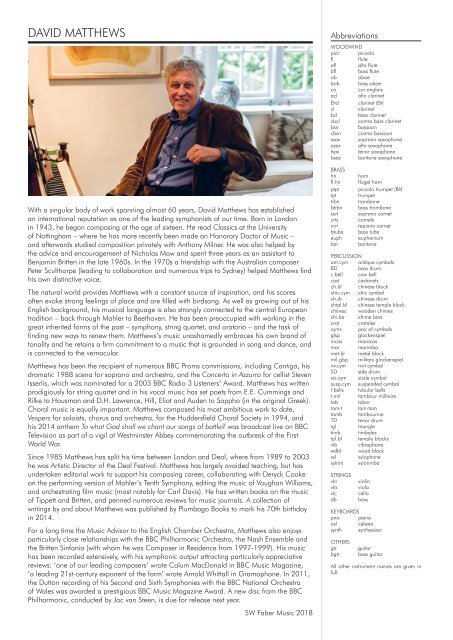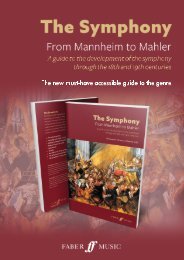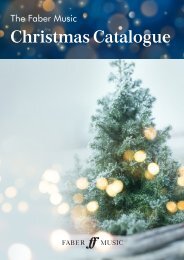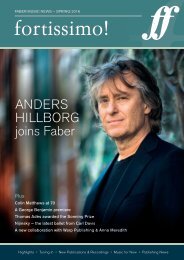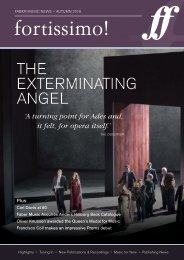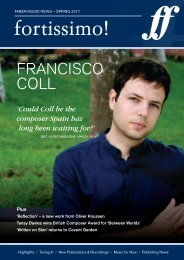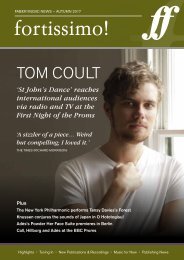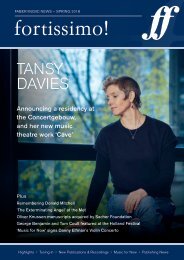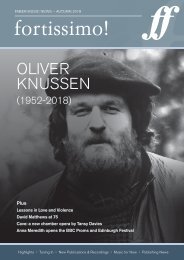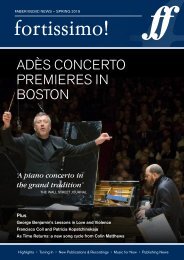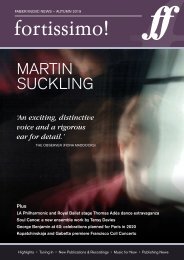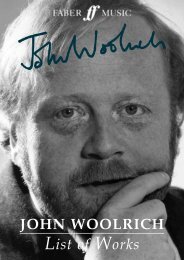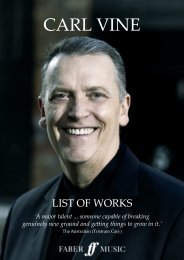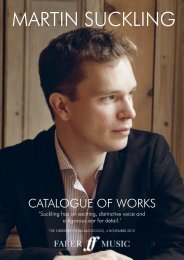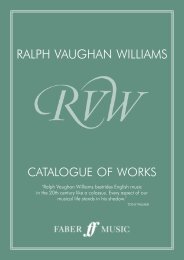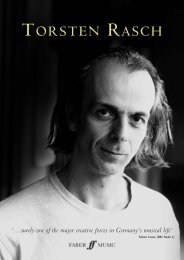David Matthews Catalogue of Works
One of the leading symphonists of our time, David Matthews is preoccupied with working in the great inherited forms of the past and the task of finding new ways to renew them. The natural world provides him with a constant source of inspiration. Peruse his catalogue of works available from Faber Music here.
One of the leading symphonists of our time, David Matthews is preoccupied with working in the great inherited forms of the past and the task of finding new ways to renew them. The natural world provides him with a constant source of inspiration. Peruse his catalogue of works available from Faber Music here.
Create successful ePaper yourself
Turn your PDF publications into a flip-book with our unique Google optimized e-Paper software.
DAVID MATTHEWS<br />
With a singular body <strong>of</strong> work spanning almost 60 years, <strong>David</strong> <strong>Matthews</strong> has established<br />
an international reputation as one <strong>of</strong> the leading symphonists <strong>of</strong> our time. Born in London<br />
in 1943, he began composing at the age <strong>of</strong> sixteen. He read Classics at the University<br />
<strong>of</strong> Nottingham – where he has more recently been made an Honorary Doctor <strong>of</strong> Music –<br />
and afterwards studied composition privately with Anthony Milner. He was also helped by<br />
the advice and encouragement <strong>of</strong> Nicholas Maw and spent three years as an assistant to<br />
Benjamin Britten in the late 1960s. In the 1970s a friendship with the Australian composer<br />
Peter Sculthorpe (leading to collaboration and numerous trips to Sydney) helped <strong>Matthews</strong> find<br />
his own distinctive voice.<br />
The natural world provides <strong>Matthews</strong> with a constant source <strong>of</strong> inspiration, and his scores<br />
<strong>of</strong>ten evoke strong feelings <strong>of</strong> place and are filled with birdsong. As well as growing out <strong>of</strong> his<br />
English background, his musical language is also strongly connected to the central European<br />
tradition – back through Mahler to Beethoven. He has been preoccupied with working in the<br />
great inherited forms <strong>of</strong> the past – symphony, string quartet, and oratorio – and the task <strong>of</strong><br />
finding new ways to renew them. <strong>Matthews</strong>’s music unashamedly embraces his own brand <strong>of</strong><br />
tonality and he retains a firm commitment to a music that is grounded in song and dance, and<br />
is connected to the vernacular.<br />
<strong>Matthews</strong> has been the recipient <strong>of</strong> numerous BBC Proms commissions, including Cantiga, his<br />
dramatic 1988 scena for soprano and orchestra, and the Concerto in Azzurro for cellist Steven<br />
Isserlis, which was nominated for a 2003 BBC Radio 3 Listeners’ Award. <strong>Matthews</strong> has written<br />
prodigiously for string quartet and in his vocal music has set poets from E.E. Cummings and<br />
Rilke to Housman and D.H. Lawrence, Hill, Eliot and Auden to Sappho (in the original Greek).<br />
Choral music is equally important. <strong>Matthews</strong> composed his most ambitious work to date,<br />
Vespers for soloists, chorus and orchestra, for the Huddersfield Choral Society in 1994, and<br />
his 2014 anthem To what God shall we chant our songs <strong>of</strong> battle? was broadcast live on BBC<br />
Television as part <strong>of</strong> a vigil at Westminster Abbey commemorating the outbreak <strong>of</strong> the First<br />
World War.<br />
Since 1985 <strong>Matthews</strong> has split his time between London and Deal, where from 1989 to 2003<br />
he was Artistic Director <strong>of</strong> the Deal Festival. <strong>Matthews</strong> has largely avoided teaching, but has<br />
undertaken editorial work to support his composing career, collaborating with Deryck Cooke<br />
on the performing version <strong>of</strong> Mahler’s Tenth Symphony, editing the music <strong>of</strong> Vaughan Williams,<br />
and orchestrating film music (most notably for Carl Davis). He has written books on the music<br />
<strong>of</strong> Tippett and Britten, and penned numerous reviews for music journals. A collection <strong>of</strong><br />
writings by and about <strong>Matthews</strong> was published by Plumbago Books to mark his 70th birthday<br />
in 2014.<br />
For a long time the Music Advisor to the English Chamber Orchestra, <strong>Matthews</strong> also enjoys<br />
particularly close relationships with the BBC Philharmonic Orchestra, the Nash Ensemble and<br />
the Britten Sinfonia (with whom he was Composer in Residence from 1997-1999). His music<br />
has been recorded extensively, with his symphonic output attracting particularly appreciative<br />
reviews: ‘one <strong>of</strong> our leading composers’ wrote Calum MacDonald in BBC Music Magazine,<br />
‘a leading 21st-century exponent <strong>of</strong> the form’ wrote Arnold Whittall in Gramophone. In 2011,<br />
the Dutton recording <strong>of</strong> his Second and Sixth Symphonies with the BBC National Orchestra<br />
<strong>of</strong> Wales was awarded a prestigious BBC Music Magazine Award. A new disc from the BBC<br />
Philharmonic, conducted by Jac van Steen, is due for release next year.<br />
SW Faber Music 2018<br />
Abbreviations<br />
WOODWIND<br />
picc piccolo<br />
fl flute<br />
afl alto flute<br />
bfl bass flute<br />
ob oboe<br />
bob bass oboe<br />
ca cor anglais<br />
acl alto clarinet<br />
E¨cl clarinet (E¨)<br />
cl clarinet<br />
bcl bass clarinet<br />
cbcl contra bass clarinet<br />
bsn bassoon<br />
cbsn contra bassoon<br />
ssax soprano saxophone<br />
asax alto saxophone<br />
tsax tenor saxophone<br />
bsax baritone saxophone<br />
BRASS<br />
hn<br />
fl.hn<br />
ptpt<br />
tpt<br />
trbn<br />
btrbn<br />
scrt<br />
crts<br />
rcrt<br />
btuba<br />
euph<br />
bar<br />
horn<br />
flugel horn<br />
piccolo trumpet (B¨)<br />
trumpet<br />
trombone<br />
bass trombone<br />
soprano cornet<br />
cornets<br />
repiano cornet<br />
bass tuba<br />
euphonium<br />
baritone<br />
PERCUSSION<br />
ant.cym antique cymbals<br />
BD bass drum<br />
c.bell cow bell<br />
cast castanets<br />
ch.bl chinese block<br />
chic.cym chic cymbal<br />
ch.dr chinese drum<br />
chtpl.bl chinese temple block<br />
chimes wooden chimes<br />
chi.ba chime bars<br />
crot crotales<br />
cyms pair <strong>of</strong> cymbals<br />
glsp glockenspiel<br />
mcas maracas<br />
mar marimba<br />
met.bl metal block<br />
mil.glsp military glockenspiel<br />
riv.cym rivit cymbal<br />
SD side drum<br />
siz.cym sizzle cymbal<br />
susp.cym suspended cymbal<br />
t.bells tubular bells<br />
t.mil tambour militaire<br />
tab tabor<br />
tam-t tam-tam<br />
tamb tambourine<br />
TD tenor drum<br />
tgl triangle<br />
timb timbales<br />
tpl.bl temple blocks<br />
vib vibraphone<br />
wdbl wood block<br />
xyl xylophone<br />
xylrim xylorimba<br />
STRINGS<br />
vln<br />
vla<br />
vlc<br />
db<br />
violin<br />
viola<br />
cello<br />
bass<br />
KEYBOARDS<br />
pno piano<br />
cel celesta<br />
synth synthesizer<br />
OTHERS<br />
gtr<br />
bgtr<br />
guitar<br />
bass guitar<br />
All other instrument names are given in<br />
full.


